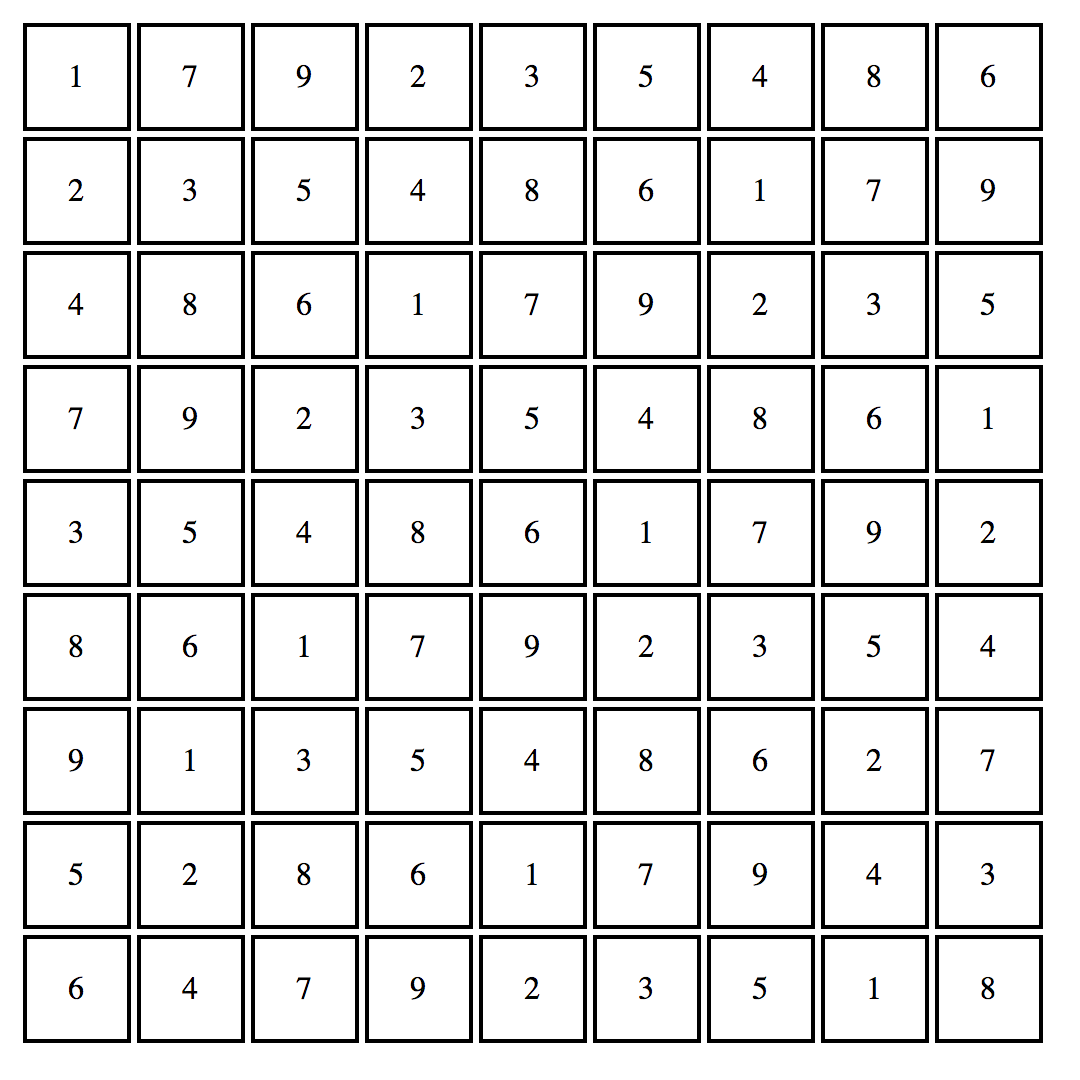Sudoku solver, and random Sudoku generator
This is a sudoku solver I made through Javascript.
This also creates a random sudoku grid/board so you can see that it can be solved.
Here is my journey.
For some reason you would like to test this out, here are some instructions.
This program has only been tested on Chrome browsers. Unsure of the functionality on other browsers.
Simply press the “Clone or download” green button and click “Download ZIP”
You can either double click the HTML file or right-click it and open to see on specific browser
-or-
Run a localhost of your choosing
Just a few documentatons of my journey through trials and error
Setting up the table was not very difficult. But it was annoying to center the text vertically and horizontally.
This is how it looked at first (with temporary template)

and after inserting
key.style.textAlign = "center";
it then looked like
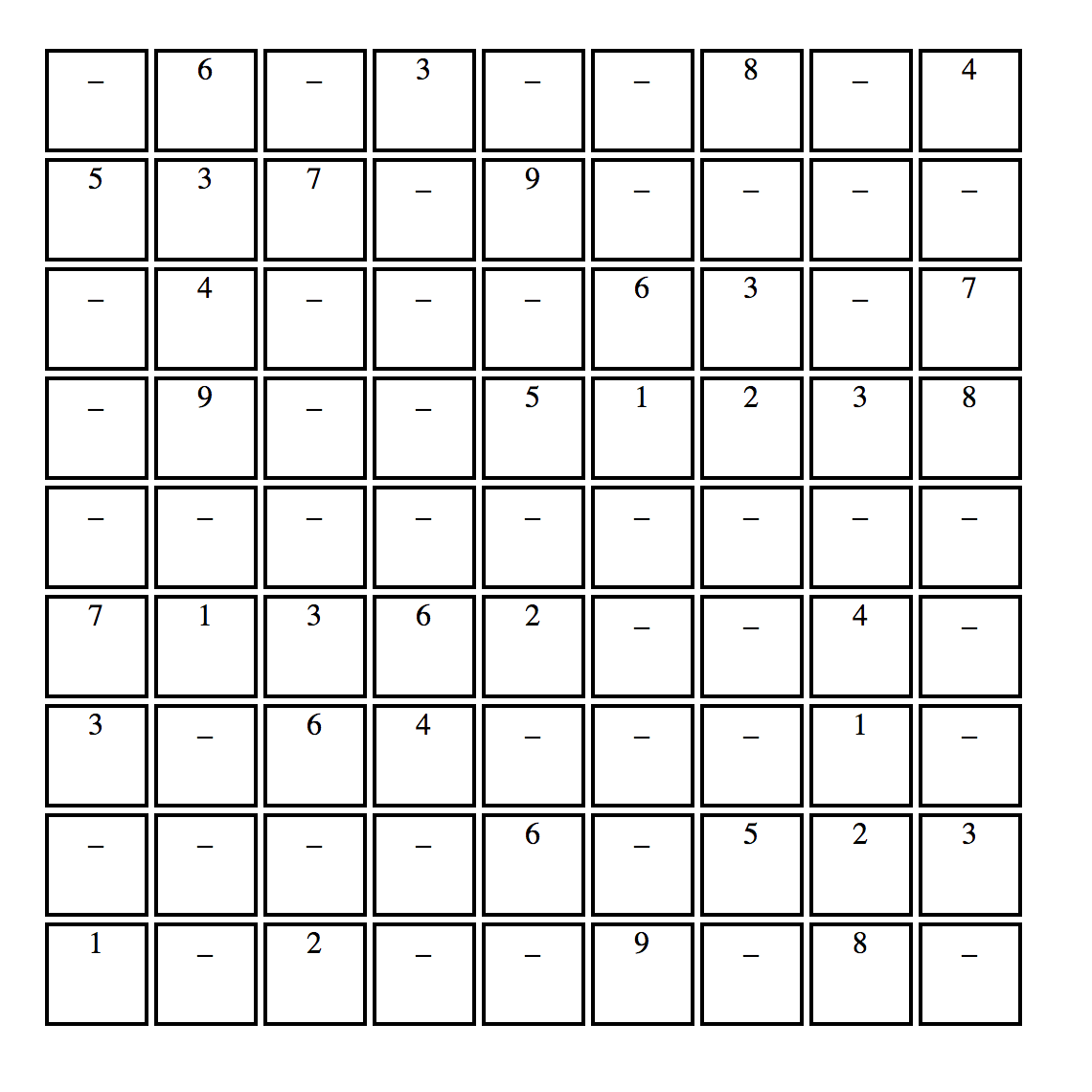
After playing around with a few lines of code I ended up having
key.style.verticalAlign = "middle";key.style.lineHeight = "50px";
but ended up realizing that
key.style.verticalAlign = "middle";
was not needed
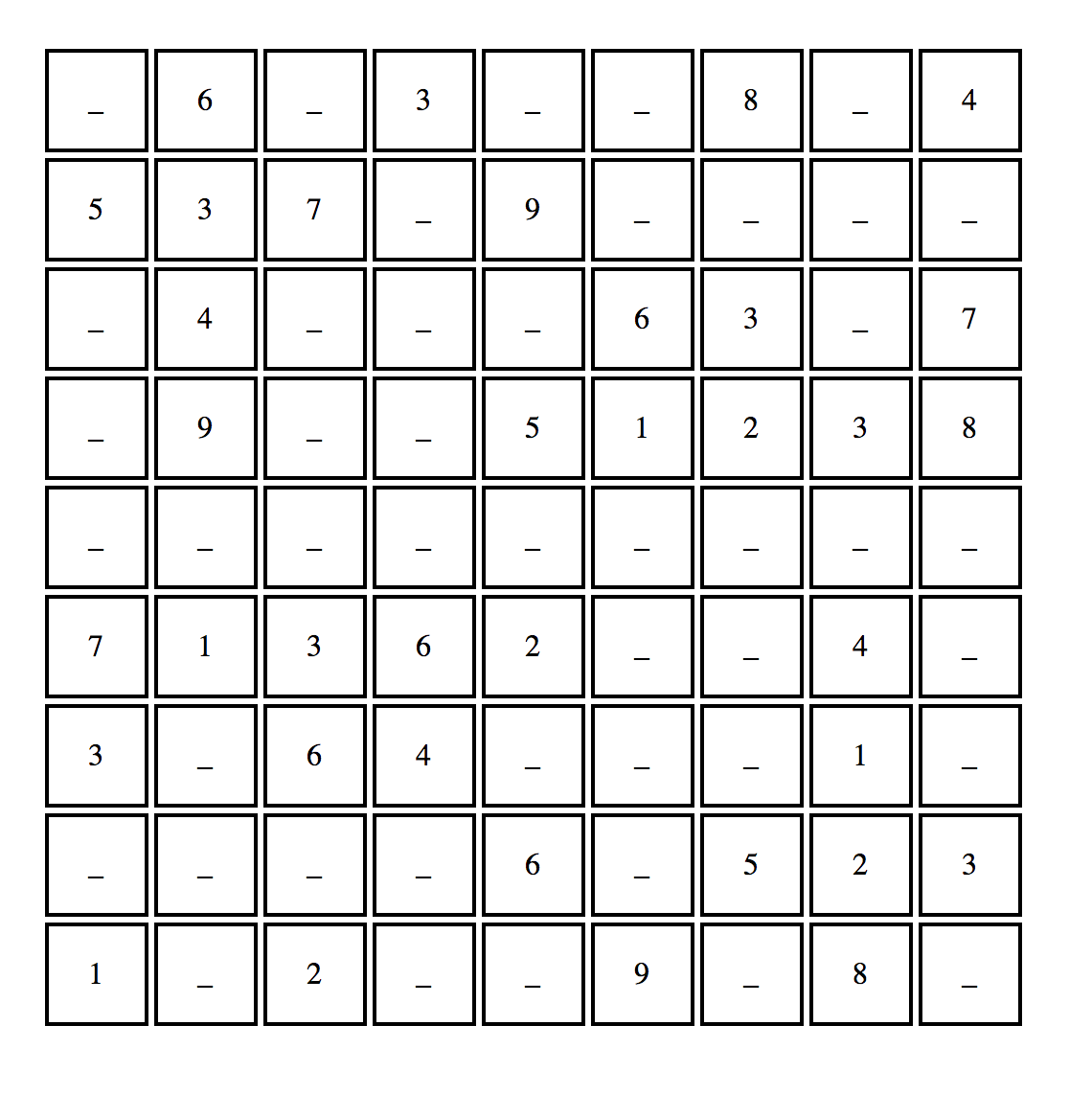
Further more, I added green dashed lines to better see the divisions of 3x3 grids (will be called green box (GB) in future reference)
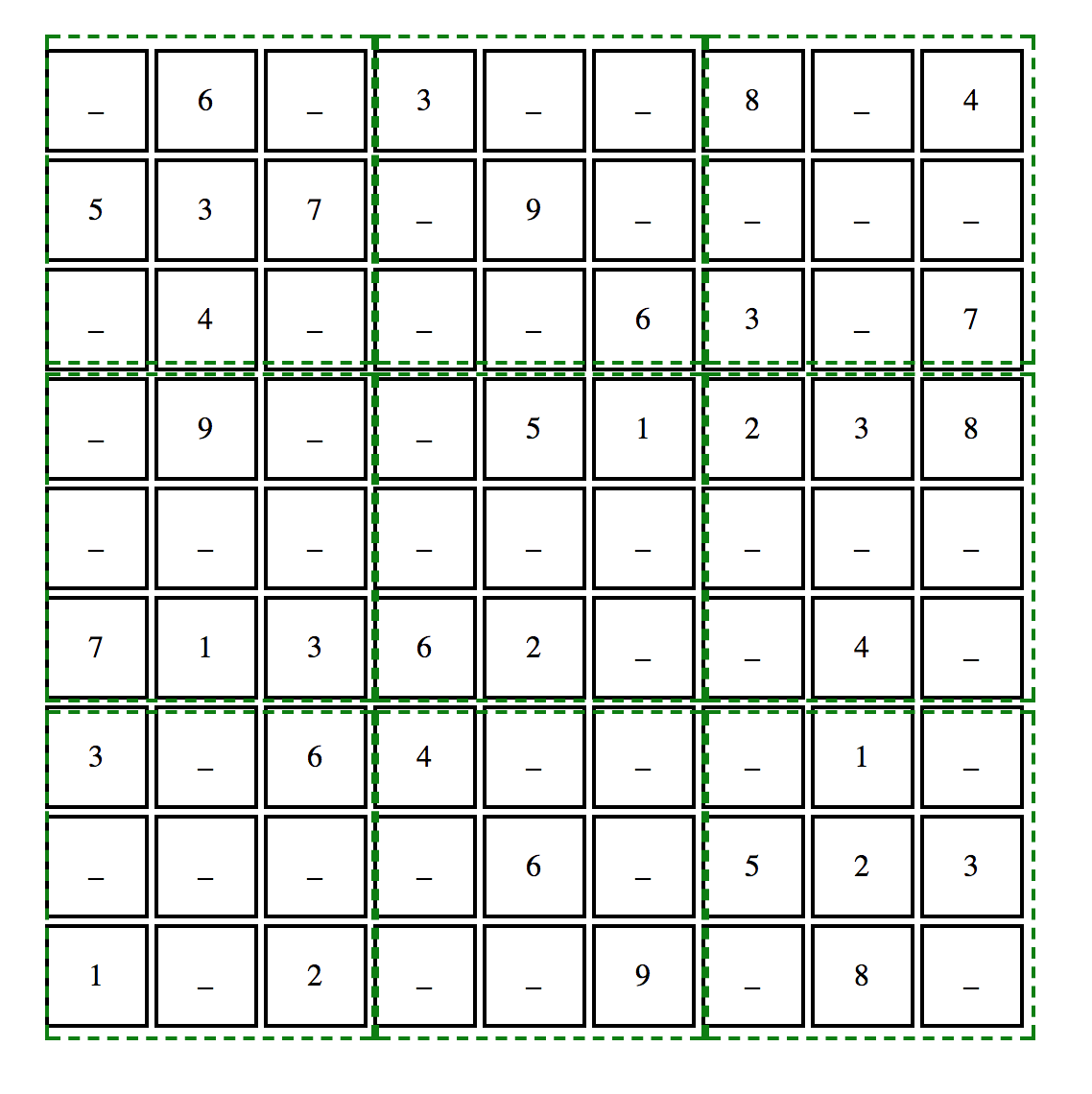
But because I was not thinking… I made a giant forloop that loops 81 times instead of having a nested forloops that prints 9by9.
Because of this, I needed to convert the current box to Cartesian coordinates (X and Y).
let x = 0;let y = 0;for(let i = 0; i < 81; i++){x = i%9;y = (Math.floor((i/9) + 1));console.log("X: " + x + " Y: " + y + " Value: " + grid1[i]);}
This is part of the output on the console:
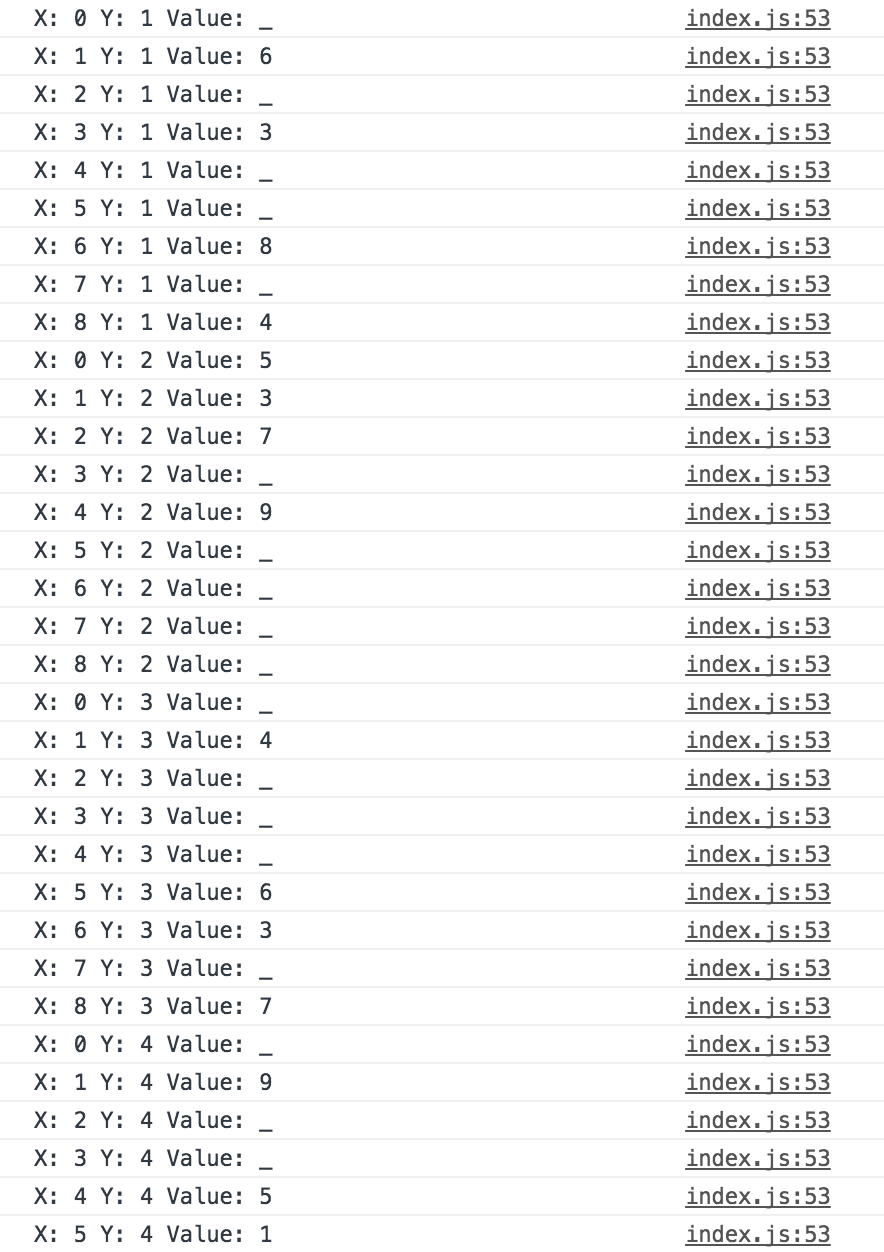
In order for me to really fully grasp how to solve this, I tried to break it down into very basic steps.
I wanted to to loop through each GB first which is each 3x3 box.
And if the element is empty, then replace it with an array.
I have
var array = [1, 2, 3, 4, 5, 6, 7, 8, 9]
and then the code
if(grid1[i] === "_")grid1[i] = array;
to replace each empty spot with an array with all numbers. This is to temporarily hold all possible values. I want to search through each GB to see if one of the numbers is in there. If it is, the certain element cannot have that value. So this is then removed as a possible value.
For example: in the example grid I have, the first GB has the values:
_ 6 _5 3 7_ 4 _
Next, I will show what happens.
In my solver.js file, I have this code to check the first set of GBs:
// First three GBsif(x <= 2 && y <= 3)if(first1(j))grid1[i] = remove(grid1[i], j);if(x <= 5 && x > 2 && y <= 3)if(second1(j))grid1[i] = remove(grid1[i], j);if(x <= 9 && x > 5 && y <= 3)if(third1(j))grid1[i] = remove(grid1[i], j);
and an example of a GB search code is essentially:
function first1(num){ // First GB in first rowfor(let x = 0; x < 9; x++){for(let y = 0; y < 9; y++){if(x%9 <= 2 && Math.floor(y%9 + 1) <= 3){//console.log(num, grid1[(x) + (y)*9])if(num == grid1[(x) + (y)*9])return true;//console.log("X: " + x + " Y: " + y + " Value: " + grid1[(x) + (y)*9]);}}}}
Which then outputs this:
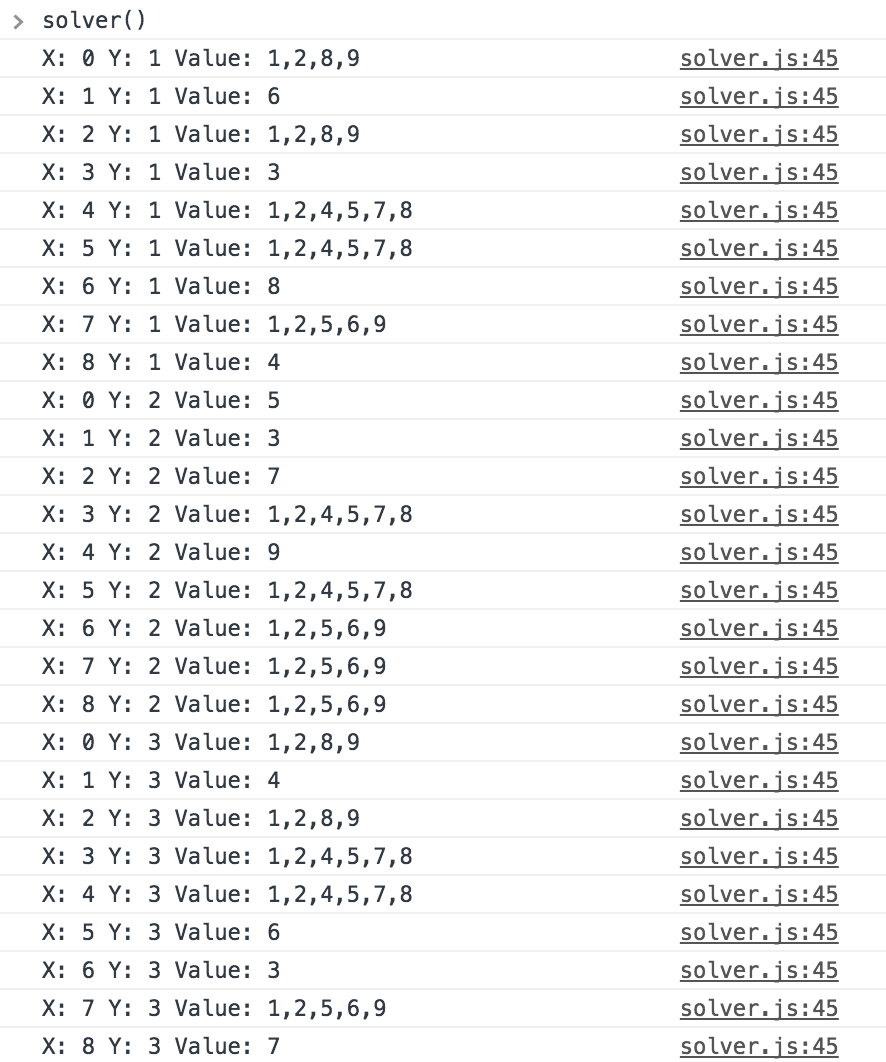
I sorta knew how to approach this but did not know how to execute it. I wanted to check each horizontal line to see if there are any matches and then take out the matched number. But I thought I can do it through a single if statement, which was very incorrect.
Instead of
if(grid1[i] === "_")
I had
if(grid[i].length > 1)
checking if the current index had more than one element. I tried to do isArray but it did not work the way I wanted and when I tried typeof grid[i] === "object" it returned that all elements were an object.
I then iterated through the forloop
for(let inx = 0; inx < grid[i].length; inx++)
because I am only checking the numbers in the array of grid[i] and not all possible values which is why I did not do
for(let inx = 0; inx < 10; inx++)
Inside this forloop, I had this If statement
if(y == 1)if(horiz1(grid[i][inx], grid))grid[i] = remove(grid[i], grid[i][inx])
This is to go through each Y, which is going through each horizontal line and checking if there is a value that matches grid[i][inx].
And in my horiz.js file, I have a function for each horizontal line
function horiz1(num, grid){let y = 0;for(let x = 0; x < 9; x++){//console.log(num, grid[(x) + (y)*9])if(num == grid[(x) + (y)*9]){//console.log("In horizIf " + grid[(x) + (y)*9])return true;//console.log("X: " + x + " Y: " + y + " Value: " + grid[(x) + (y)*9]);}}}
The console.log()s helped tremendously in terms of debugging, but more on that later.
This basically goes through every X element while y is at a constant value. Then going through each element in this row where num is grid[i][inx].
I was trying to grid[i] = remove(grid[i], inx) and was wondering why this was not working. A lot of problems were rising and that was because value 8 is in index 2, and for some reason 2 was being removed from the array. I thought it was an index problem but I was taking out the index from the array, so I then replaced the code with grid[i] = remove(grid[i], grid[i][inx]) which did what I want to do.
Other problems I ran across would be where the If statement should go and when. I thought the position of the If statements and forloops were in the best place. This was figured out through a lot of debugging and a whole bunch of console.log() everywhere.
Even the horiz.js file’s functions had problems. I made it go through the whole 81 elements and not just the row. Also, it kept returning true because I was comparing num to essentially itself.
In the end, this is what I ended up with:
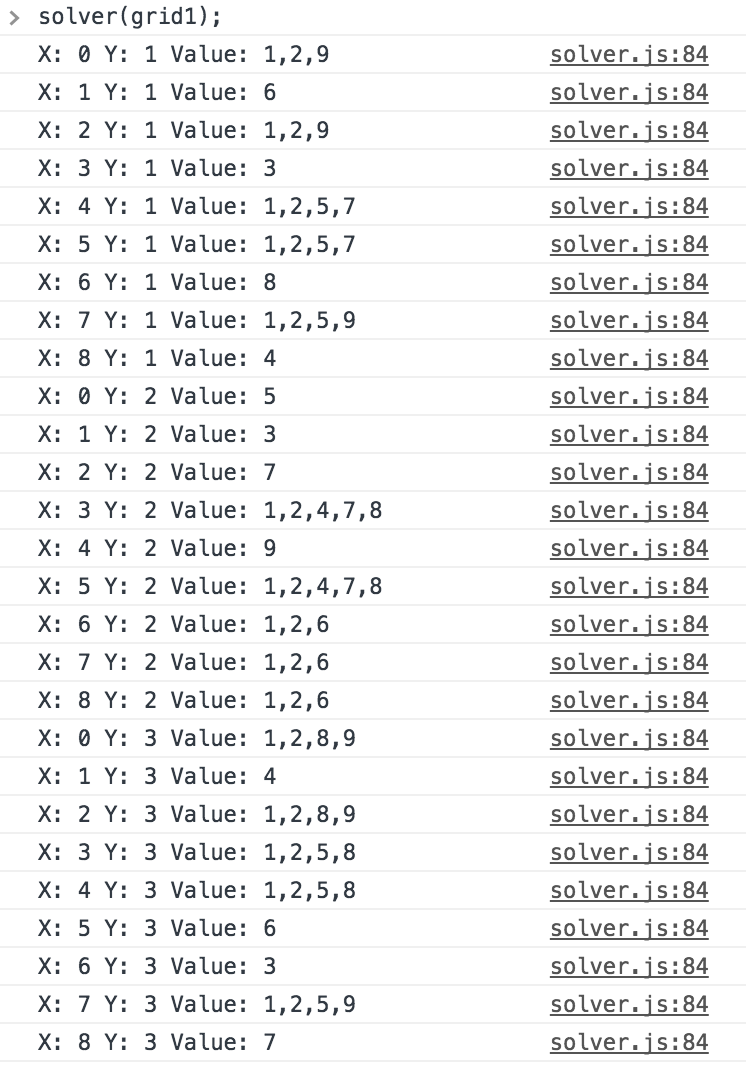
I am sorry. I realized that the earlier code didn’t take out ALL the elements in the array that found a match because after removing an element in an array, the index skips to the next one. I found this error when Y = 2. So then I commented out all the other if statements and only checked when Y = 2.
Putting a whole bunch of console.log()s into the horiz2 function to see if num == grid[(x) + (y)*9]
And when it did, it wouldn’t do it for the second element because it skipped it.
I then fixed this problem by having
if(y == 2)if(horiz2(grid[i][inx], grid)){grid[i] = remove(grid[i], grid[i][inx]);inx--;}
Which then resets the index back to where it should be and this works fine.
Which results in this:
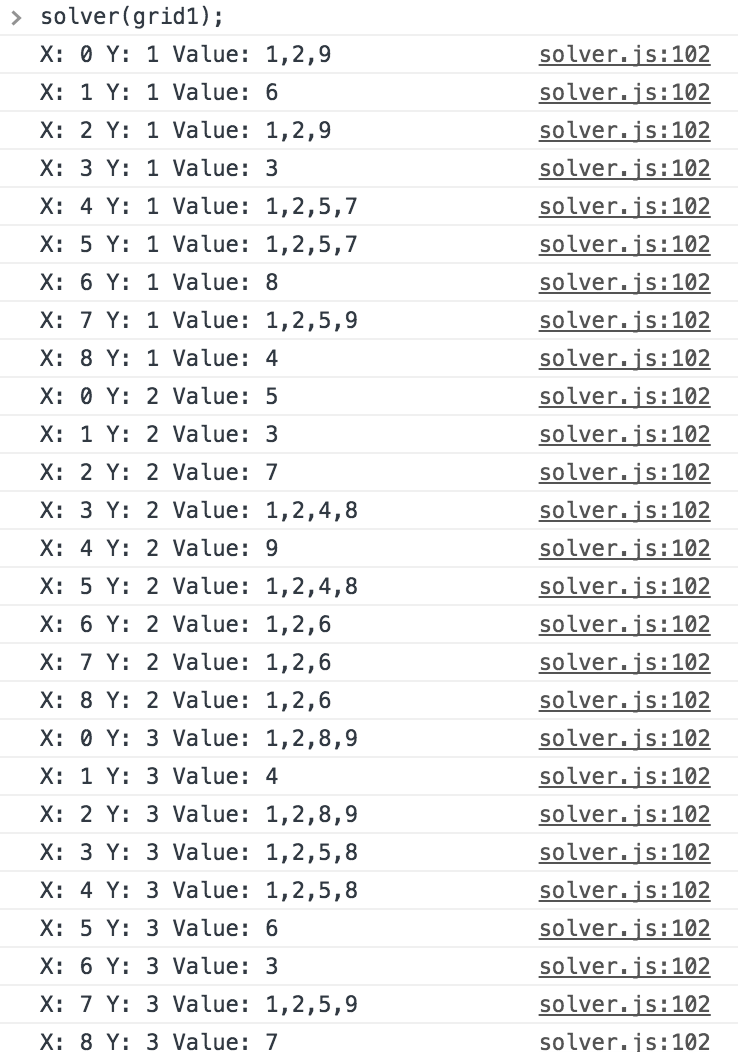
if(x == 0)
if(vert1(grid[i][inx], grid)){
grid[i] = remove(grid[i], grid[i][inx]);
inx--;
}function vert2(num, grid){
let x = 1;
for(let y = 0; y < 9; y++)
if(num == grid[(x) + (y)*9])
return true;
}if(x == 0) statements with a if(y == 1) statement so it does not run twice.
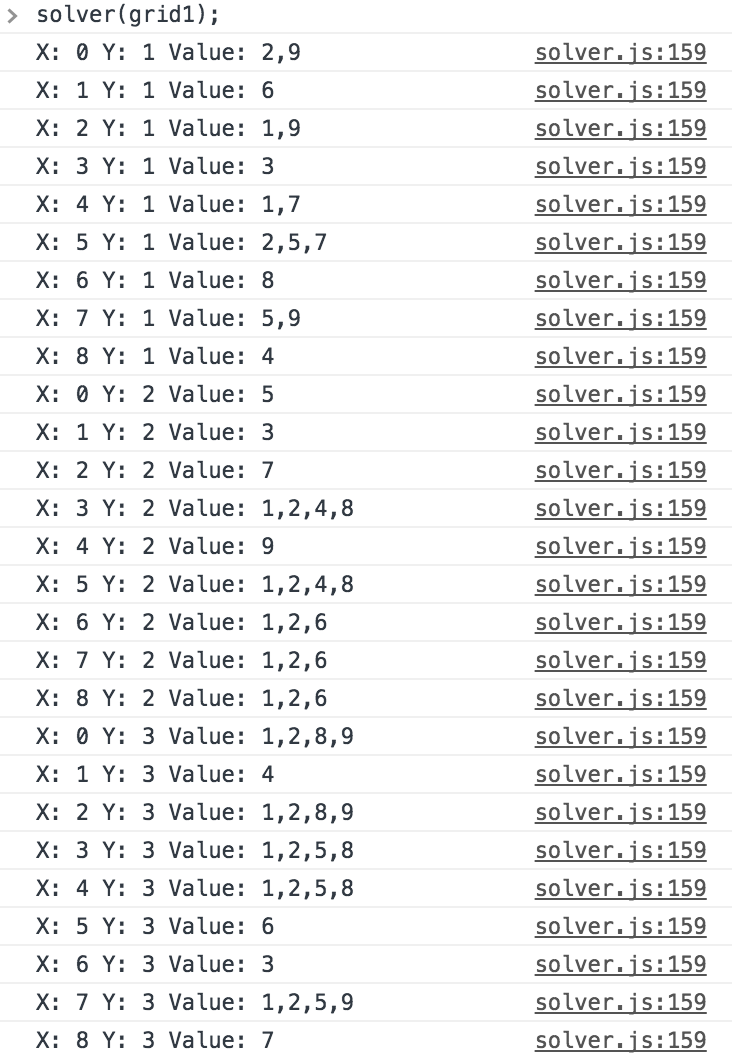
So I realized that my code was NOT working the way I wanted it to…
When I put the results out on the grid, this is what it looked like:
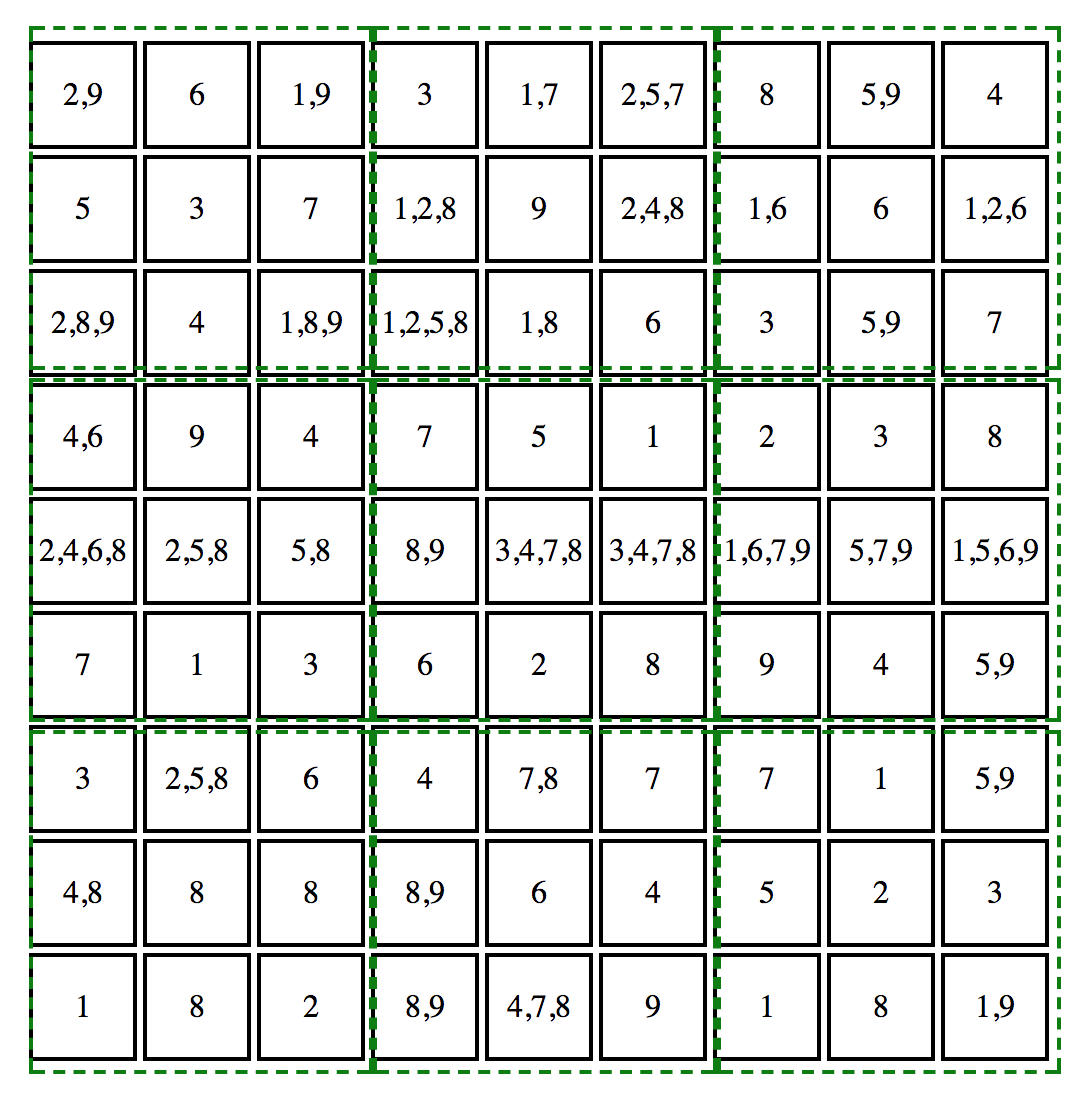
And this obviously did not work. If you look at Y = 8, GB = 7, then you can see that there are multiple 8s. It took several commenting out code and console.log()ing to figure out the issue which was in my GB forloop.
if(x <= 2 && y <= 9 && y > 6)if(first2(j, grid))grid[i] = remove(grid[i], j);if(x <= 5 && x > 2 && y <= 9 && y > 6)if(second2(j, grid))grid[i] = remove(grid[i], j);if(x <= 9 && x > 5 && y <= 9 && y > 6)if(third2(j, grid))grid[i] = remove(grid[i], j);
Do you see the problem?
Let me show the solution
if(x <= 2 && y <= 9 && y > 6)if(first3(j, grid))grid[i] = remove(grid[i], j);if(x <= 5 && x > 2 && y <= 9 && y > 6)if(second3(j, grid))grid[i] = remove(grid[i], j);if(x <= 9 && x > 5 && y <= 9 && y > 6)if(third3(j, grid))grid[i] = remove(grid[i], j);
I was calling first2, second2, and third2 instead of first3, second3, and third3.
This fixed all errors thus far.
Which then gives the grid:
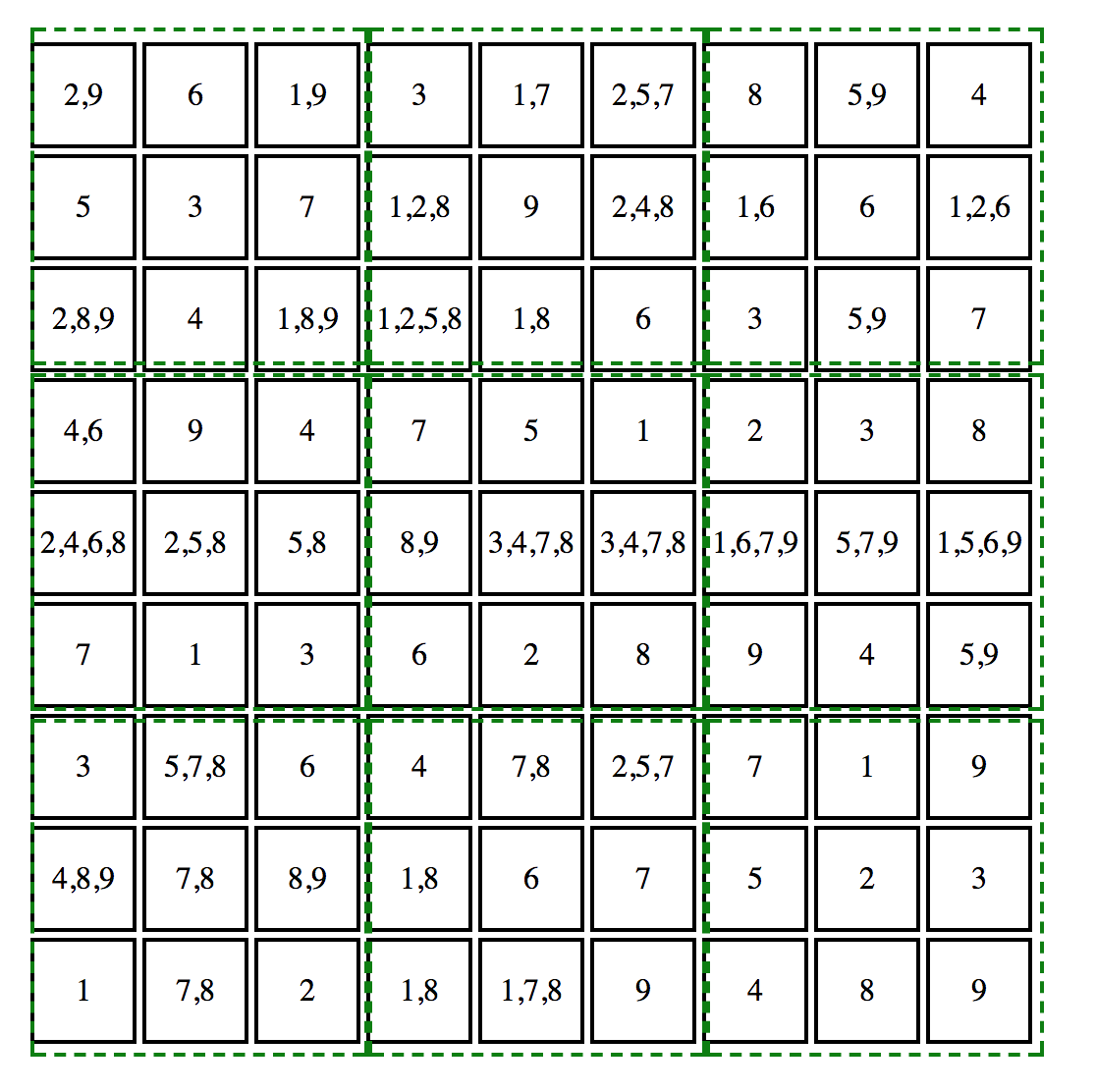
This is just editing the error in the last grid. It was another spelling error and calling a function wrong.
Fixed, and here are results:
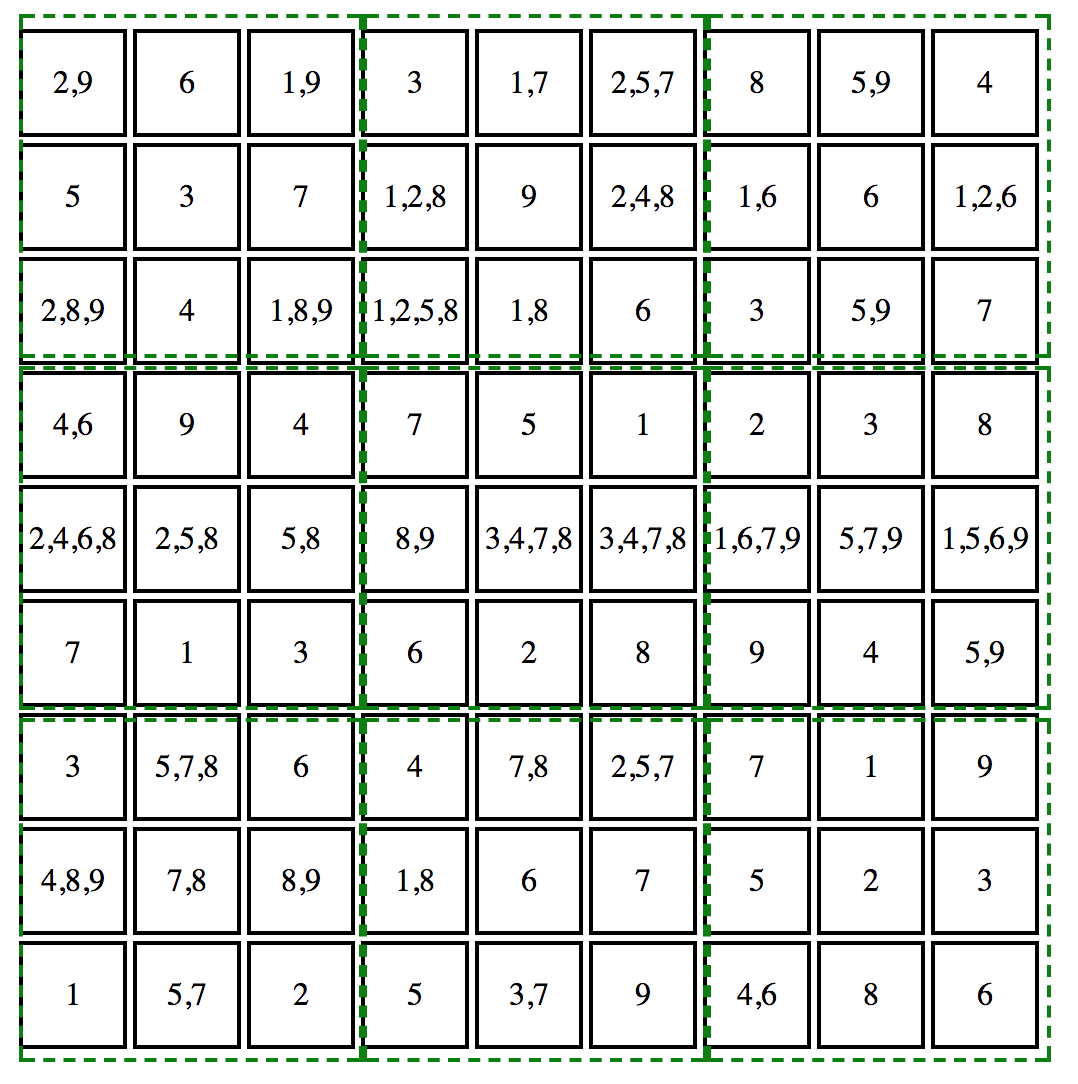
and I added && grid[i].length > 1 to a lot of the if statements so that it does not take out an element if the length of the array is only 1. Before, I was returning empty elements and this was obviously not something that should happen.
Only works with somewhat simple Sudoku puzzles. It does not work for the more complex ones. That will be a project that will be finished in the future.
This was done by calling solver a couple times.
Before:
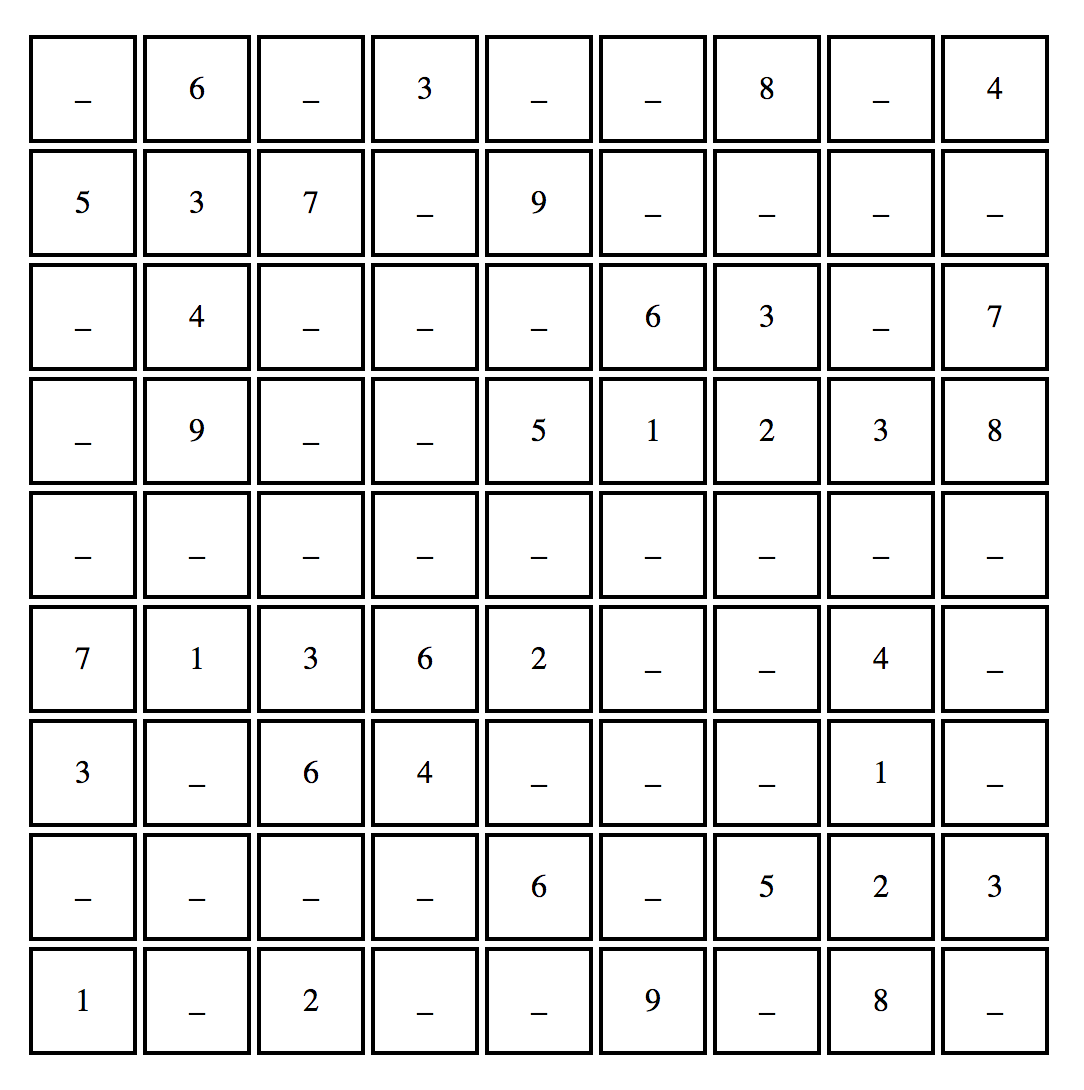
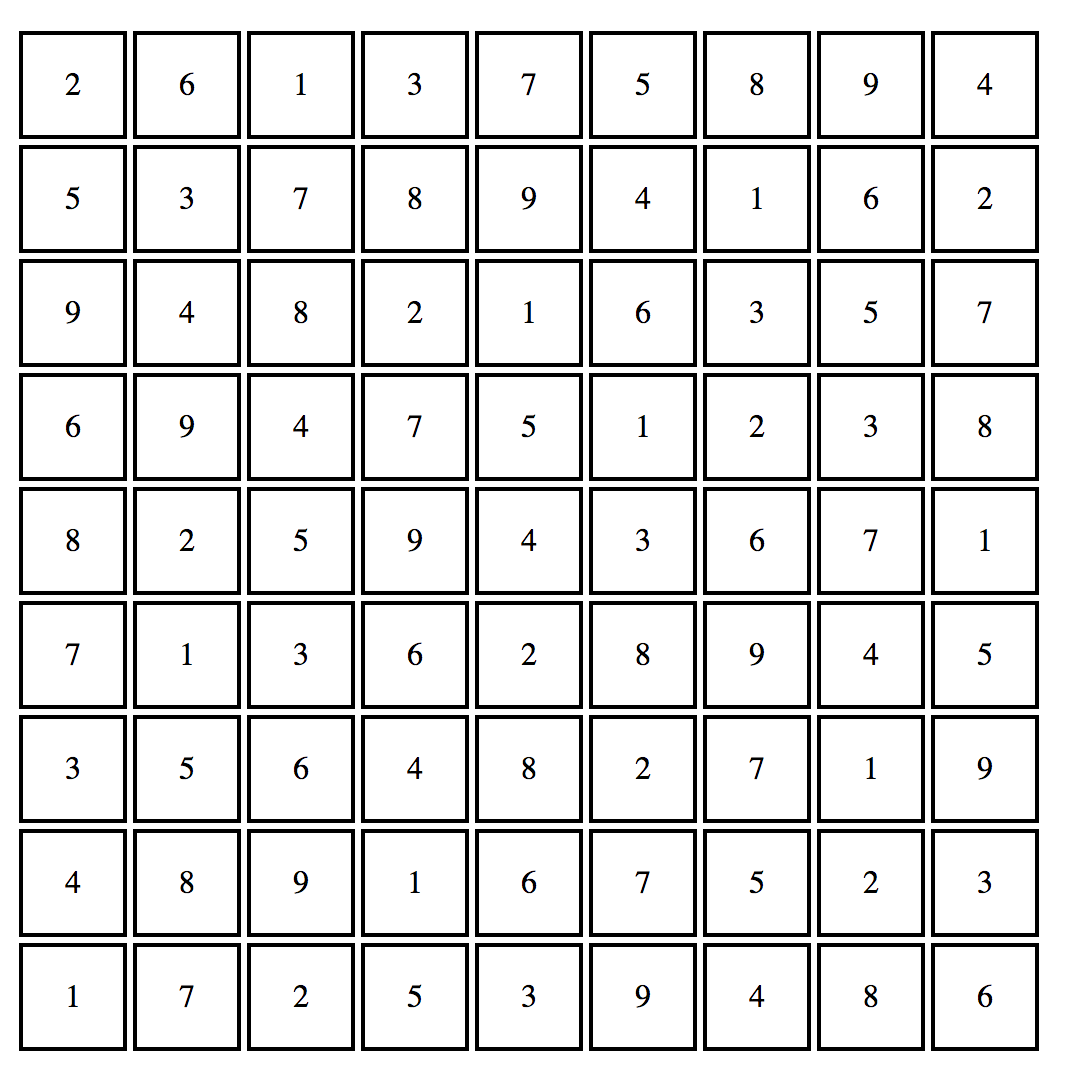
I wanted to make a random sudoku generator from scratch and this first started off to be very difficult. I didn’t know where to even start.
I first tried to make random arrays of numbers from (1-9) and then inserting it into a grid and changing it so that there isn’t the same number in the same Column.
var rand_grid = [];for(let i = 0; i < 9; i++)rand_grid[i] = randArray();for(let x = 0; x < 9; x++)for(let y = 0; y < 9; y++){rand = Math.floor(Math.random() * 9) + 1;if(checkRow(x, y, rand))rand_grid[x][y] = rand;elsey--;}function randArray(){array = [1, 2, 3, 4, 5, 6, 7, 8, 9]var tmp, current, top = array.length;if(top)while(--top) {current = Math.floor(Math.random() * (top + 1));tmp = array[current];array[current] = array[top];array[top] = tmp;}return array;}function checkColumn(x, y, rand){//console.log("In Check");for(let i = 0; i < 9; i++)if(rand_grid[x][i] === rand)return false;return true;}
Let me break this down into simpler terms.
My function function randArray() is supposed to randomize an array of all integers from 1-9 and output that array.
The first forloop
for(let i = 0; i < 9; i++)rand_grid[i] = randArray();
just inserts the random arrays into the grid. And then the second forloop is supposed to check for redundent numbers in the same row and switch it out with a number that works; this worked for every coumn, however, there were row conflicts.
So after I made a
function checkRow(x, y, rand){//console.log("In Check");for(let i = 0; i < 9; i++)if(rand_grid[x][i] === rand)return false;return true;}
It took forever for the program to run. There was some sort of error no matter where I put it in the forloop. So because of this, I needed to find a new approach.
How about making an array, and having the rest of the grid dependent on that array, but shifted so it will never match another number in the same column, row, or GB?
This was a good approach, but might be confusing to some.
Here is a screenshot of what a simple sudoku template is supposed to look like:
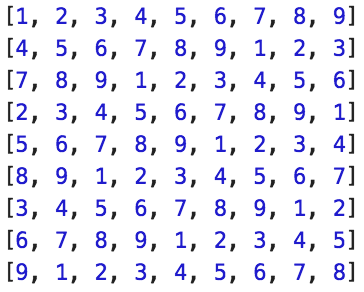
Making this manually was very simple, obviously; however, making this somewhat dynamically was a little more difficult.
I tried using the in-build functions such as .splice() and .push() so I can take out certain elements and push it in the back. But this brought way too many errors.
So then I had to do the longer way, which was to do
temp = [test[3], test[4], test[5], test[6], test[7], test[8], test[0], test[1], test[2]];rand_grid[i] = temp;
in each if statement. Each if and else if statements are corresponding to each Y value.
After changing some of the indexes (which were also very confusing) and then addidng a shuffle function which looks like this:
function shuffle(a) {var j, x, i;for (i = a.length - 1; i > 0; i--) {j = Math.floor(Math.random() * (i + 1));x = a[i];a[i] = a[j];a[j] = x;}}
the random sudoku maker works.
This is what it looks like on the console:
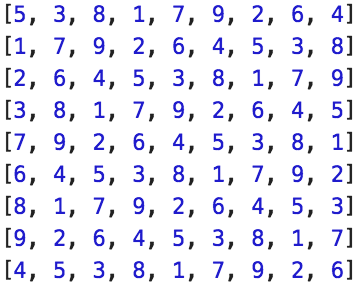
I was trying to bring it to the function setGrid(grid) which also calls function drawGrid(grid) and this came across an error because I had a multidimensional array for my randomized grid, but my draw and solver only works for a one-dimensional array. Because of this, I just had to transform the multi-dimensional array into a one-dimensional array.
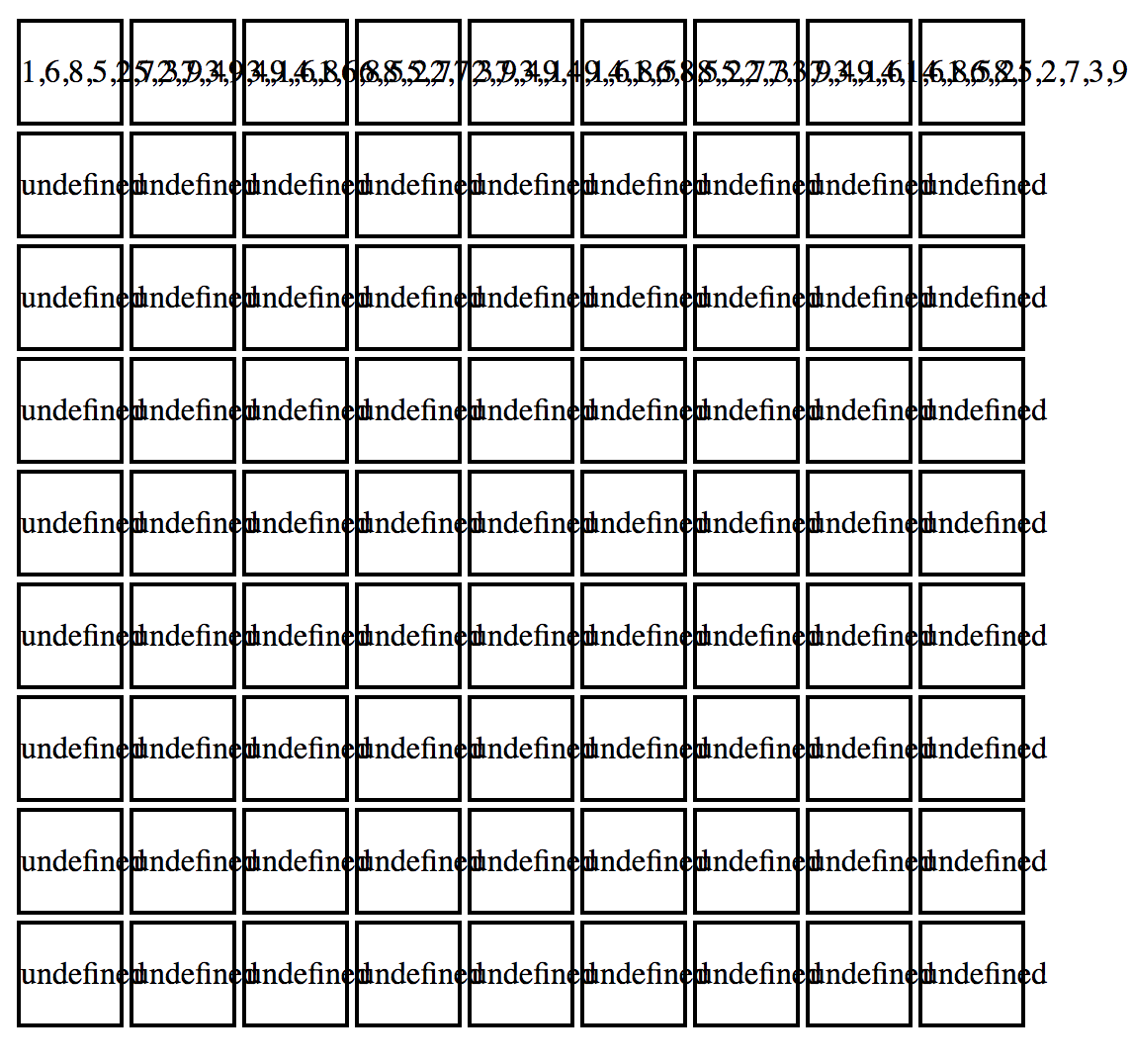
This was happening because an arary is stored in an array. The drawGrid function is inserting each array, and not going into it. Which is why there are undefined elements after the first arary.
After addind the line of code rand_grid = rand_grid.toString().split(""); which should conver it into a string then break it into an array, it gives this:
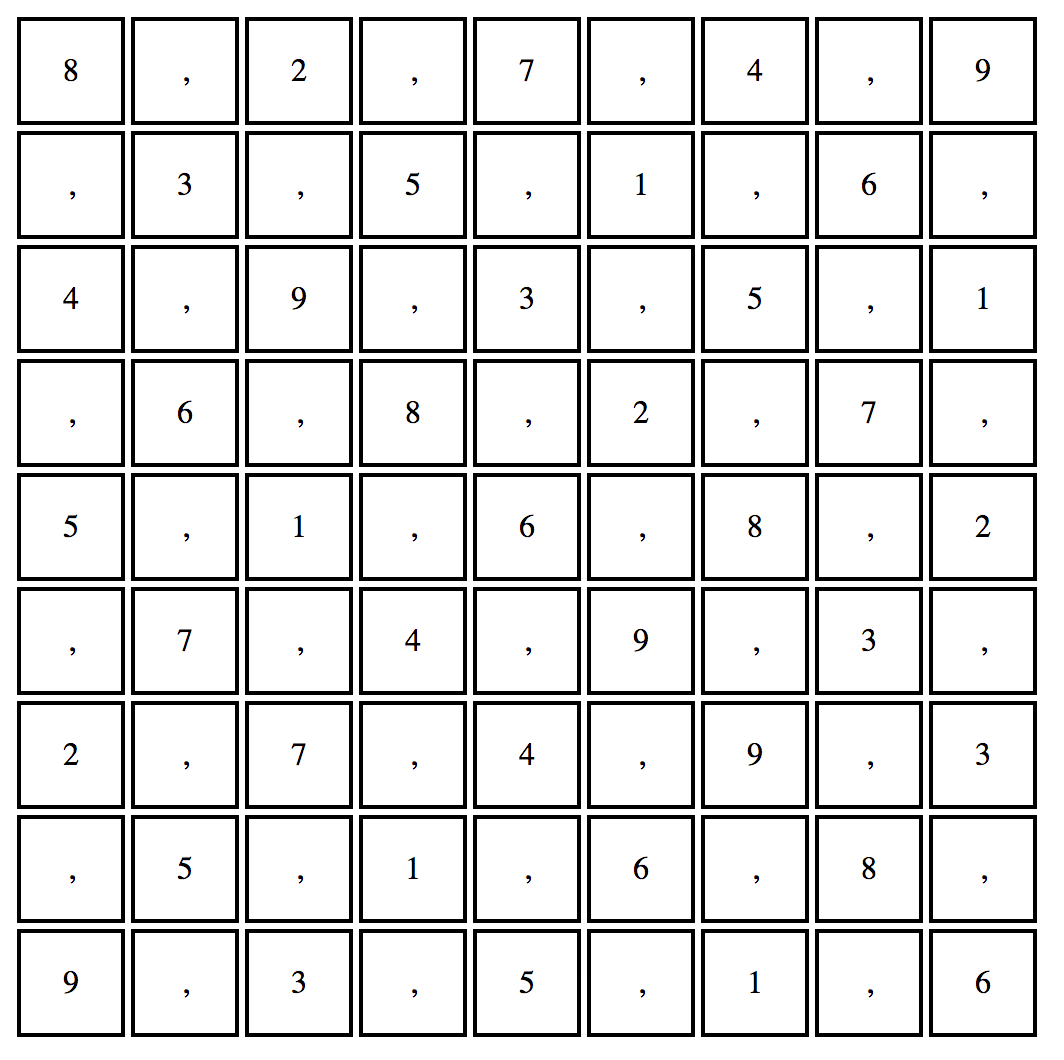
which is not what I want. It brough the “,” into the array.
I tried doing
for(let i = 0; i < rand_grid.length; i++){if(rand_grid[i] === ","){rand_grid = rand_grid.splice(i, 161);}console.log(rand_grid[i] + " " + i);}
but this gave me more errors than I wanted.
So then I wanted to take advatange of my remove function I made earlier which is
function remove(array, element) {return array.filter(e => e !== element);}
And then
for(let i = 0; i < rand_grid.length; i++){if(rand_grid[i] != ","){console.log(i + " " + rand_grid[i]);grid[counter] = remove(rand_grid, i)[i];//i--;counter++;}}
having initialized grid and counter variables earlier.
Which gave the desired result that looks like this:
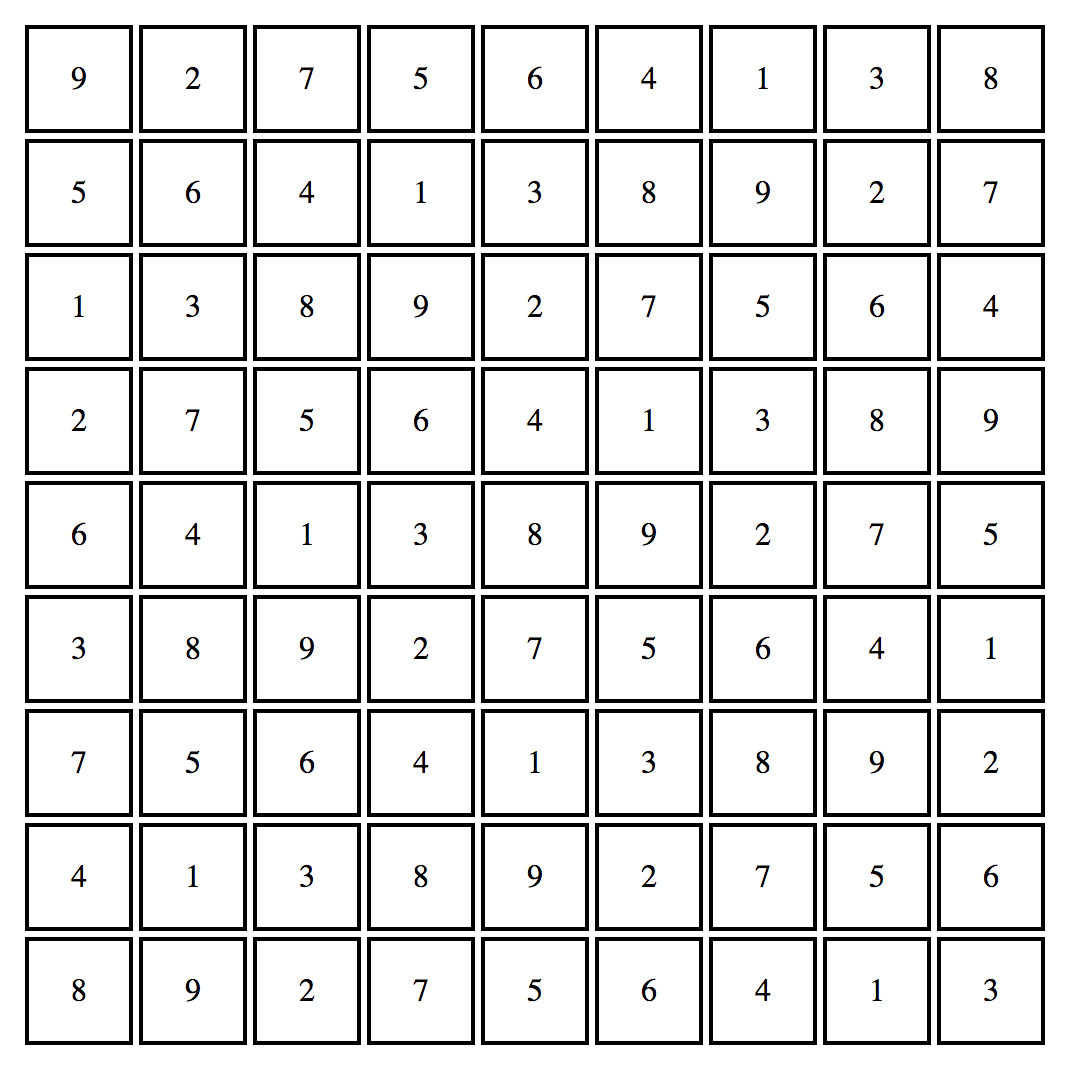
I wanted to make a forloop that will insert “_” randomly.
I knew how to do it, but I didn’t know how to execute it. Took me some time to think through it and came to a somewhat decent solution. I have two random number generators: one for seeing how many “_” to make and the other one to randomly put it in whatever index.
With some playing around, this was the resulting code:
for(let i = 0; i < 9; i++){var five = Math.floor(Math.random() * 5) + 1;for(let j = 0; j < 9; j++){var nine = Math.floor(Math.random() * 2)+ 1;if(2 === nine && five-- >= 0){rand_grid[i][j] = "_";j--;}}}
Which then resulted in this:
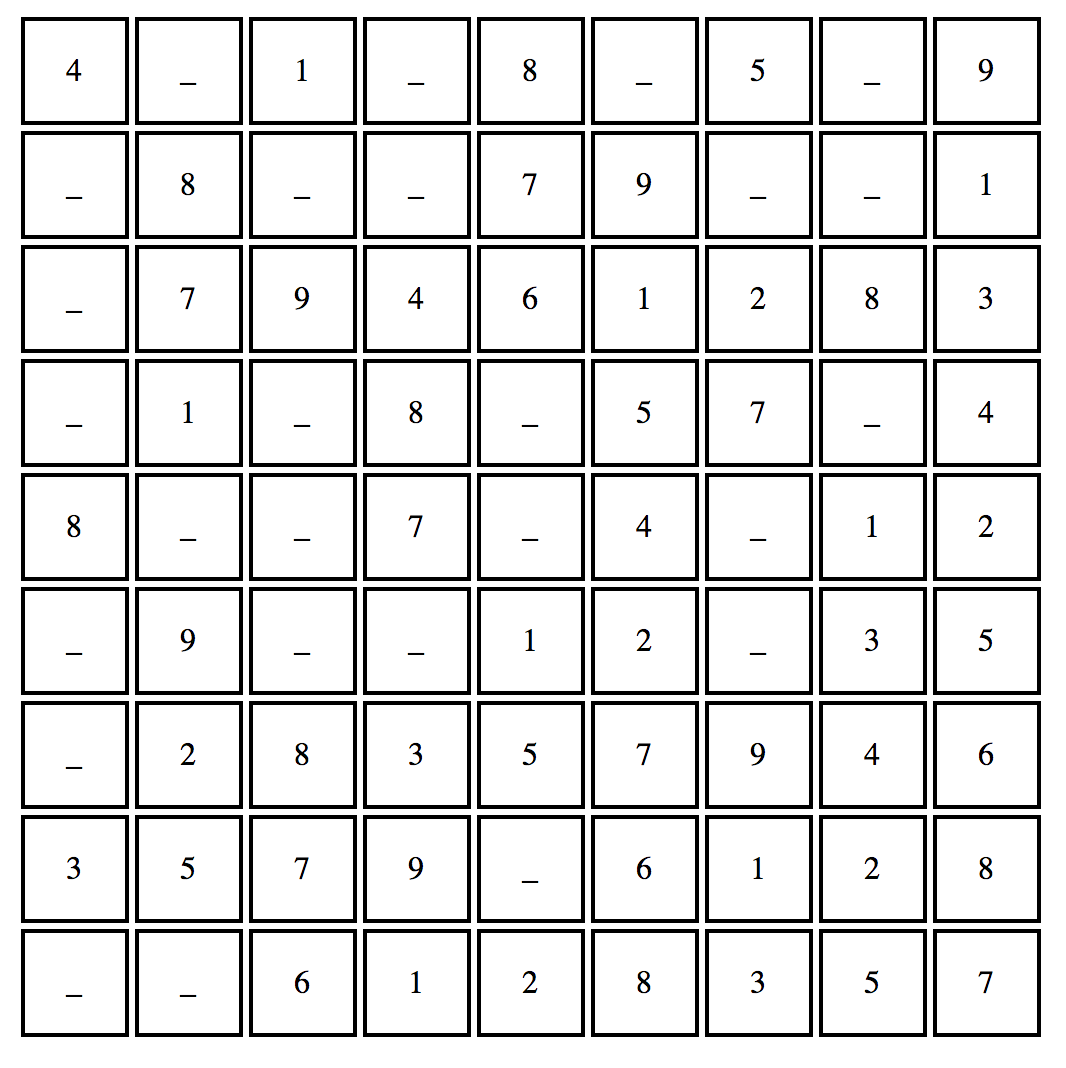
Usually, if there are multiple solutions, then my code breaks and returns an array of possible values. Because of this, I always let the first redunant array equal its first element.
for(let i = 0; i < 81; i++){if(tempGrid[i].length > 1){tempGrid[i] = tempGrid[i][0];break;}}
This solved the redundant solution problem. But sometimes, one time is not enough. So I made a forloop that runs it x amount of times to be fully sure it is solved. I tried to do it in a while loop but it failed to many extents.
But now it works.
Before:
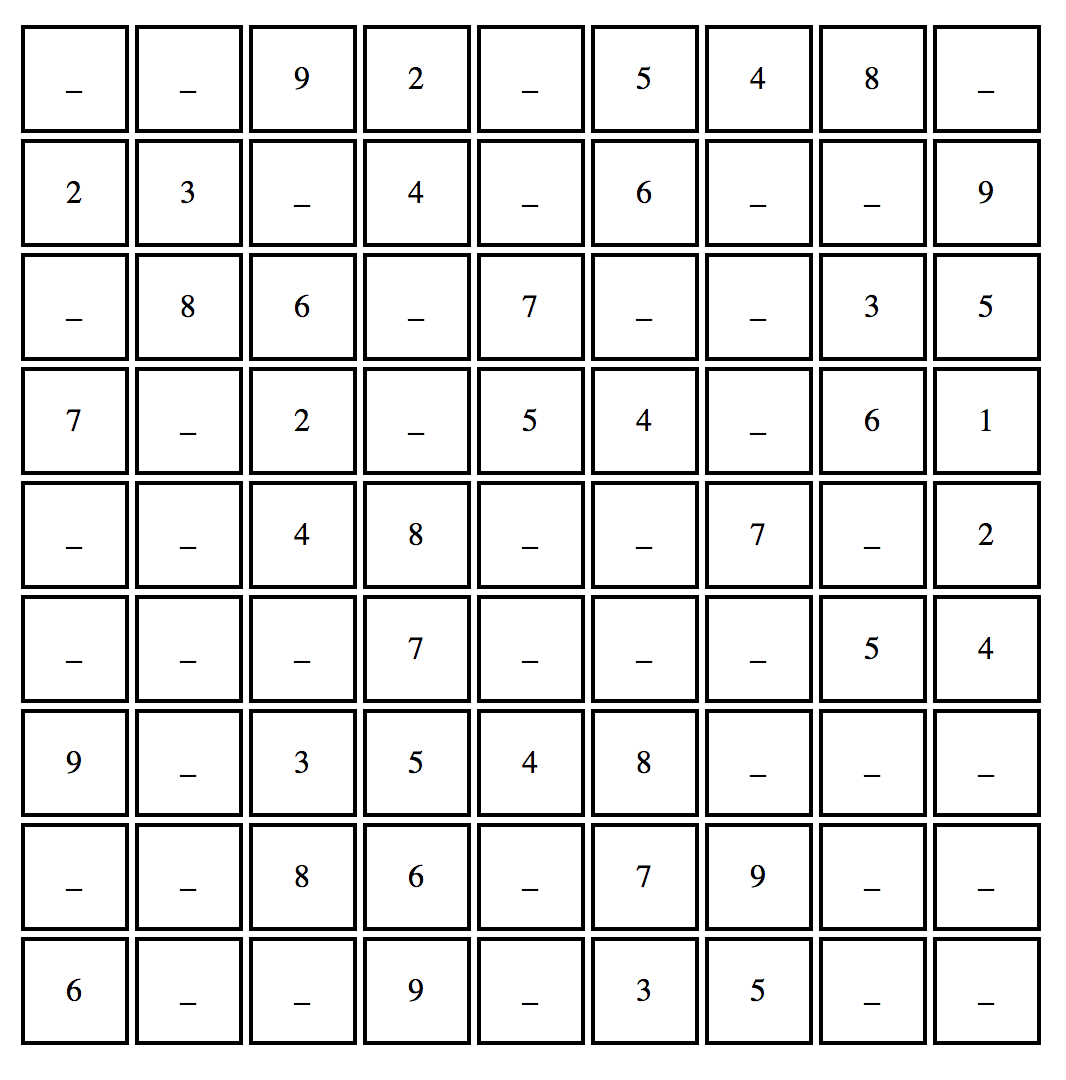
After:
